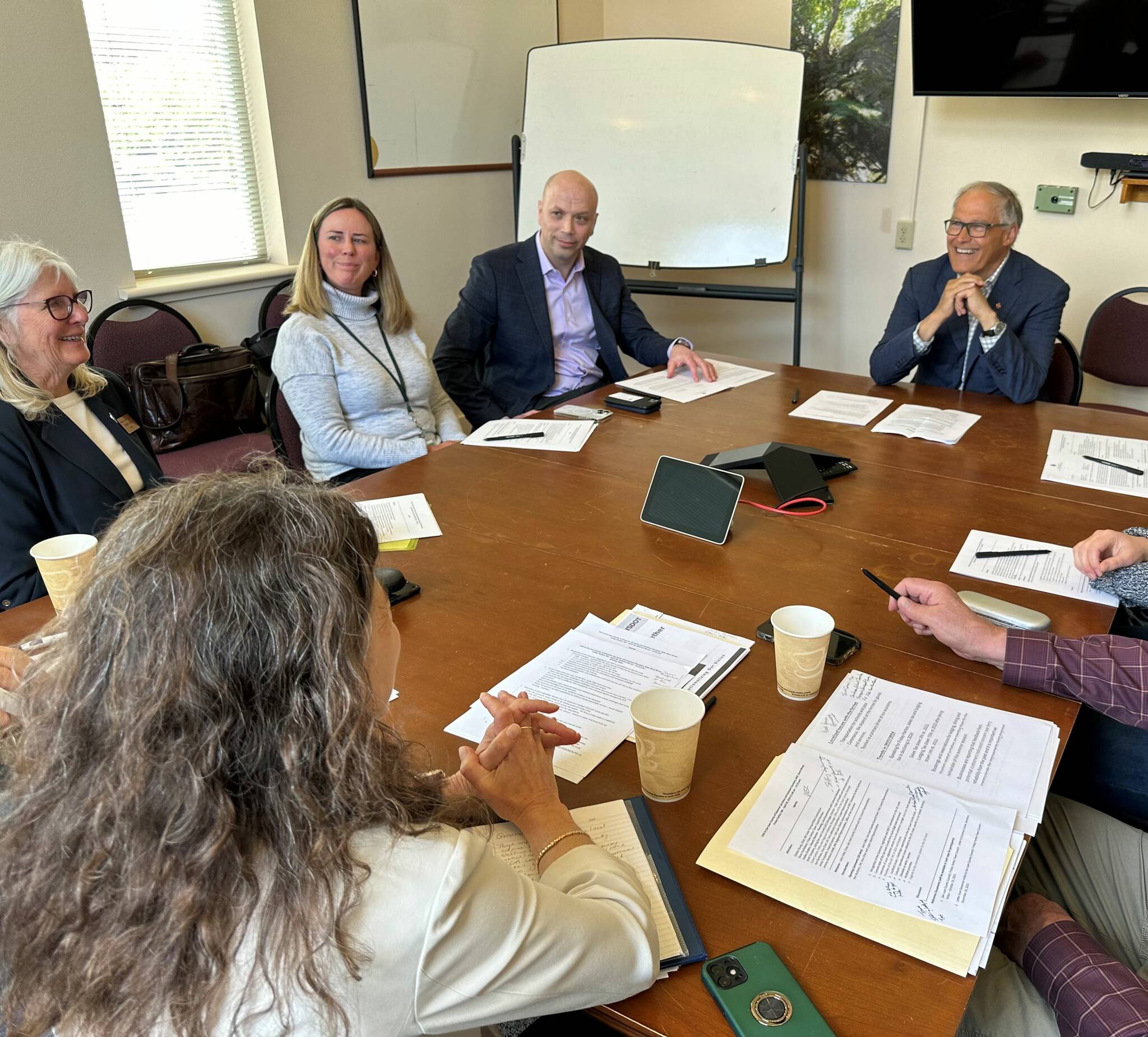Submitted by San Juan County
San Juan County officials met with Washington State Governor Jay Inslee and Assistant Secretary of the Washington State Ferries Steve Nevey to discuss ferry service and solar power in the San Juans.
“I was pleased to welcome both the governor and WSF leadership to discuss the challenges we’re facing here in San Juan County,” said Council Chair Jane Fuller. The Governor’s presence signaled his ongoing commitment to improved reliability of service on our ferry route and this was underscored with the presence of the new Assistant Secretary of WSF.
With the Governor’s office, Council Chair Fuller organized a meeting with transportation representatives including the WSF Assistant Secretary, Deputy Director of Planning, Customer and Government Relations, Hadley Rodero, and the Chair of the State Transportation Commission, Debbie Young. Also, in attendance to discuss the ongoing impacts of disruptive ferry service in the islands were San Juan County staff and partner organizations from around the County including Steve Hushebeck of the Friday Harbor Town Council, the Vice-Chair of the San Juan County Ferry Advisory Committee, Ken Burtness, and the local San Juan Island Federal Express representative, Jenny Fouquette. Governor Inslee and State transp. reps meet on SJI 4.29.24
The meeting reflected items addressed by the letter that the San Juan County Council and the Friday Harbor Town Council wrote to Governor Inslee and Transportation Secretary Millar in October of 2023. The letter outlined a list of short-term local solutions and asked for the opportunity to work with the state’s Department of Transportation and WSF to enact meaningful change. The Governor’s response to that letter in December of 2023 and his December budget, paved the way for the Legislature to fund a passenger-only ferry study as well as requests for secondary on-call crew and analysis of economic impacts of ferry service disruptions.
“It was important to me that we gather stakeholders together and have an honest, constructive conversation about what can be done to improve ferry service here in the islands,” said Council Chair Fuller. “The meeting was focused, productive, and an opportunity to further our relationship with these critical partners. I’m hopeful that it will result in continued open dialogue and collaboration in seeking local solutions to challenges we face.”
During the meeting, the group recognized and thanked the Governor, the Legislature, and WSF for their ongoing commitment to improving service across the ferry system and on the San Juan Islands route. Attendees discussed the current state of the San Juan County ferry route and reviewed the outcomes of the Governor’s 2023 budget and the 2024 legislative session.
“Things are improving,” noted Gove. Inslee. “We got the passenger-only ferry service study through the legislature, WSF staffing has improved significantly, and vessel acquisition is on track. I’m here today to hear your critiques, thoughts, input, and ideas.” Throughout the meeting, he reiterated his commitment to accelerating the reservation system upgrade and ensuring the passenger-only ferry study and the economic impact study stay on track. He also noted the challenges those projects face, stating, “Some people view ferries as a luxury as opposed to a critical element in our transportation system, so coming up with a steady stream of long-term funding is very difficult based on those politics.”
Council Chair Fuller and Ferry Advisory Committee Vice Chair Ken Burtness laid out the Ferry Advisory Committee’s priorities moving forward, including a continued focus on finding localized solutions to challenges experienced on the SJC route; addressing cultural and operational issues specific to the islands’ terminals and connectivity to the Anacortes terminal; finalizing the schedule re-write for the San Juans Islands and addressing the need for equity and accountability in establishing and adhering to island quotas on the route; improving the medical preferential loading program for the San Juan Islands; advancing reservations for Lopez Island; initiating upgrades to the reservation system; and establishing a San Juan County Ferries ‘communications’ page on the SJC website where the public can provide feedback and obtain important ferry information.
Afterward, County Councilmember Cindy Wolf met the state officials at the ferry terminal for a meet and greet with WSF staff. From there, County Councilmember Christine Minney met the officials at the County’s fairgrounds where Parks and Fair Director Brandon Andrews shared details of the solar array atop the main exhibit hall.
Solar panels on top of the fairgrounds buildingThe two 105 x 41-foot multi-grid solar systems are projected to produce over 4.5 million kilowatt hours (kWh) of energy and save the county over $700,000 in utility costs over their 30-year lifespan. In the first year, the panels generated more than double the annual usage of the Fairground’s facilities – roughly 158,000 kWh. This energy savings is roughly equivalent to offsetting CO2 emissions from 13 homes or charging 8,314,263 smartphones, according to the Environmental Protection Agency’s Greenhouse Gas Equivalencies Calculator.
“I was proud to show the Governor the county’s investment in renewable energy,” said Councilmember Christine Minney.
The Governor also met with representatives from OPALCO to discuss the Bailer Hill Microgrid project. The county has published a ‘Public Engagement Guide’ to help the community understand how they can participate in the public comment and hearing examiner process.
San Juan County remains committed to working with the State and local partners to improve ferry service reliability and address broader transportation challenges into the future.



